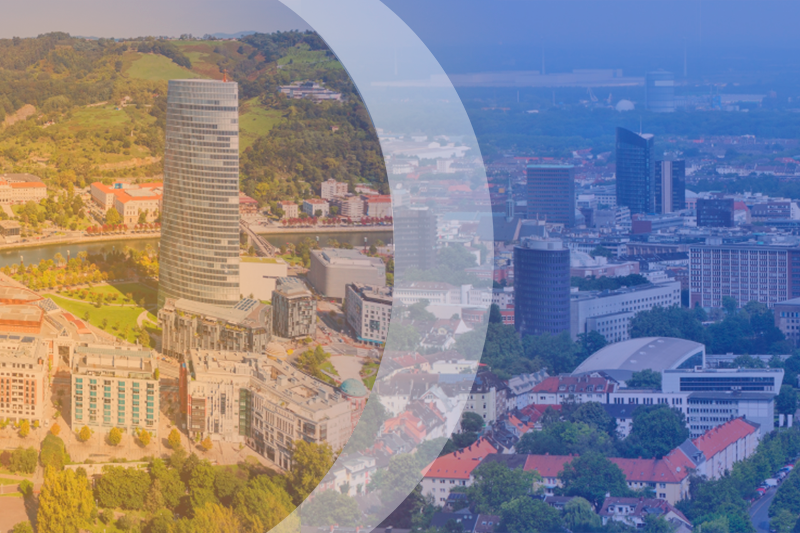Across Europe, many former industrial heartlands face the same dilemma: How can regions that once thrived on steel, machinery, and coal reinvent themselves for a future defined by data, knowledge, and service? The TerriServ project tackled this question by looking at two of Europe’s emblematic post-industrial regions – the Basque Country and Ruhr Valley in Germany. Both regions share a proud industrial history and are now striving to build knowledge-driven economies.
At the core of this transformation lies a powerful but often underestimated force: Territorial Servitization. The idea behind Territorial Servitization is that the future of regional economies depends on how well manufacturing and service activities blend together to create new value propositions. Industrial firms no longer compete solely through physical products but through the services and solutions that surround them. However, the transition from production-based to service-driven innovation doesn’t happen automatically.
Services in this context refer specifically to Knowledge-Intensive Business Services (KIBS). These are companies offering specialized expertise in areas like engineering, digitalization, R&D, logistics, and management consulting. They enable manufacturing and technology firms to innovate, become more efficient, and stay globally competitive. They act as translators between technology and business needs, helping industrial companies digitize, introduce new business models, and respond to global sustainability challenges. In short, without KIBS, transformation stalls.
The power of collaboration: when KIBS meet industry
Problematically, many regions still struggle to connect their KIBS with their industrial base. The TerriServ research found that when these connections are weak or missing, the broader regional transformation slows down. Both regions do illustrate how the connection between industry and KIBS can be strengthened, but also how demanding this process is in practice.
In the Basque Country, regional policymakers, cluster associations, and development agencies have a long-standing trajectory of fostering collaboration between the innovation ecosystem and the manufacturing fabric. Structured initiatives such as thematic networks, innovation platforms, and joint development programs have led to promising partnerships. This background offers significant potential for enhancing the connection between industry and KIBS. Yet, industrial mindsets – particularly in smaller size companies – that prioritize proven technologies over new service models still slow the pace of change.
The Ruhr Valley, meanwhile, follows a somewhat different path. Its dense landscape of universities, research institutions, and emerging KIBS firms provides fertile ground for innovation, but the region’s decentralized governance and diverse industrial base make coordination more complex. Many KIBS in the Ruhr are therefore driving transformation themselves, establishing the region as a growing hub for expertise in areas such as IT security, greentech, and digital engineering. This bottom-up dynamic complements ongoing industrial change.
What’s holding regions back
Both regions share similar obstacles. Industrial firms, especially small and medium-sized ones, are often hesitant to engage with service providers they don’t know. Many prefer to solve problems internally rather than reach out for external expertise. On the other side, KIBS sometimes “don’t speak the language” of industry – their value proposition remains abstract, and potential clients struggle to see the concrete benefits. The result is what researchers call a “network failure”: potential partners exist, but they don’t find each other or fail to build trust. This mismatch makes it difficult to fully exploit the innovative potential within the region. In the Basque Country, intermediaries such as the regional economic development agency (SPRI), cluster associations and local development agencies have begun to bridge that gap by hosting matchmaking events and collaborative pilot projects. In the Ruhr Valley, similar efforts are now gaining traction, supported by new hubs and university spin-offs.
Another shared challenge concerns talent. Both regions are strong in education but face difficulties in retaining skilled professionals. Younger talent, especially in digital and technical fields, tends to move away. Creating attractive, knowledge-intensive jobs is therefore a necessity for post-industrial regions.
Europe learns by comparing
One of the TerriServ project’s greatest strengths has been the European collaboration. Researchers from Ruhr University Bochum, Deusto University and Orkestra have worked together with policymakers and stakeholders from both regions to understand how regional structures, cultures, and policies influence TS. This cross-border learning turned out to be highly valuable. The Basque Country’s structured, policy-led approach showed the value of long-term planning and institutional alignment. The Ruhr Valley, in turn, demonstrated the creativity that can arise from a more decentralized, bottom-up environment. By comparing both, the project revealed that there is no single blueprint for success – but rather a shared need for coordination, experimentation, and continuous learning.
This European perspective matters. While industrial decline is often seen as a local issue, the solutions are increasingly transnational. Knowledge travels – and so do people, skills, and services. By exchanging ideas and strategies, and learning from each other, European regions can accelerate their collective transformation.
Looking ahead: connecting the dots
The TerriServ project’s main message is clear: KIBS are not just an add-on to the economy – they are active agents of change, binding industry, innovation, and regional development together. Without them, industrial transformation risks becoming a patchwork of isolated efforts. With them, regions can build thriving ecosystems by integrating the best of their industrial heritage with the opportunities of a digitalized, service-driven world.
For policymakers, this means strengthening intermediaries that connect firms, making KIBS more visible, and supporting networks that encourage experimentation and collaboration. For companies, it means recognizing that innovation increasingly comes through partnerships and shared expertise. Ultimately, the experience from the Basque Country and the Ruhr Valley shows that Europe’s post-industrial regions are far from being stories of decline. With the right connections – between services and industry, between knowledge and practice, between subregional territories, regions and nations – they can become laboratories of renewal and sources of sustainable growth.

Miren Estensoro
Miren Estensoro is a Researcher at Orkestra-Basque Institute of Competitiveness and a lecturer at Deusto Business School. She holds a PhD in Economics from the University of the Basque Country. Her research area is mainly local economic development, territorial governance and multi-level coordination of competitiveness policies.

Timon Urs Knapp
Timon Urs Knapp holds a Master’s degree in Sales Engineering and is a Research Associate at the Chair for Industrial Sales and Service Engineering at Ruhr-Universität Bochum, Germany. In his research, he employs qualitative methods and focuses on the strategic phenomenon of International Servitization and its implications on inter- and intraorganizational collaboration.













